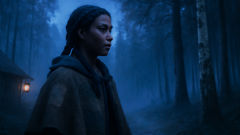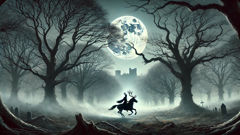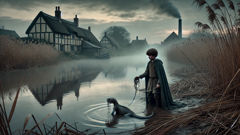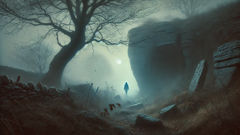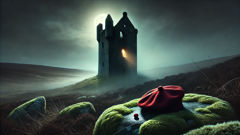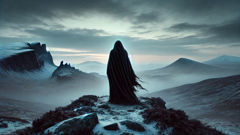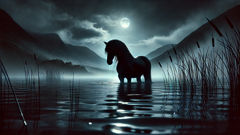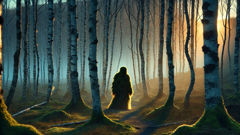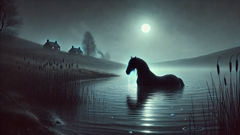Introduction
The land around Lake Onega is a tapestry of birch and pine, stitched together by shrouds of swirling mist and the ceaseless whisper of wind. In the deep folds of this northern Russian wilderness, dusk arrives as an ancient ritual: shadows slip between the trees, the air chills with secrets, and the old stories stir from their slumber. On evenings when the moon is a thin sickle, villagers bar their doors and whisper warnings of Likho—the one-eyed embodiment of bad luck and calamity, whose presence is felt more than seen. Children learn early to fear the single-eyed shadow that prowls the forest’s edge, and elders remember winters when misfortune walked among them, its footsteps muffled but relentless. Yet in this world where fate is as real as frost, and a curse may be inherited like a family heirloom, courage blooms quietly. Here, in a hamlet pressed tight against the woods, a young woman named Katya lives with her grandmother, raised on tales that are half warning and half hope. Katya’s life has never been free from hardship: her father lost in a hunting accident, her mother claimed by fever, and her own days marked by a string of small misfortunes—a broken spindle, a spoiled pail of milk, a lost lamb in the woods. But Katya is stubborn, her spirit honed by adversity, and her heart is not yet resigned to the weight of her fate. As the nights grow longer and omens multiply—a black raven circling the well, a patch of withered rye in the fields—the village’s unease thickens. Grandmother’s warnings, once mere stories to frighten restless children, now feel like desperate prayers. When a mysterious shadow slips through the village, leaving a trail of bad luck in its wake, Katya realizes that the Likho is not just a story: it is a force, ancient and real, stalking her world. And so begins a journey into the heart of darkness, where Katya must decide if she can change her destiny—or if misfortune is a shadow no one can escape.
I. The Shadow at the Threshold
Katya’s mornings begin before the sun cuts through the mist. She moves through her grandmother’s hut—one of a handful clustered along the river—listening to the world awaken: the soft coo of doves under the eaves, the distant barking of dogs, the clatter of water drawn from the well. Life is simple but heavy, each day shaped by chores and the unspoken fear that luck could sour at any moment.
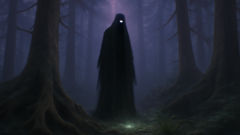
In their cramped kitchen, Grandmother’s voice is a thread binding the fragile peace of their home. She is a stooped figure, eyes bright beneath her kerchief, hands gnarled from years of work and worry. As Katya kneads dough for morning bread, Grandmother mutters charms to ward off evil—tying red string above the door, sprinkling salt at the threshold, tracing protective circles in the flour. “Likho listens when we least expect,” she warns, her voice low. “Luck is a wild thing in these woods.”
Katya tries to brush off the warnings, but the days feel skewed, as if some force is twisting fate. Villagers murmur about cows gone dry, roofs collapsing in windless nights, and children waking with strange nightmares. Katya herself is pursued by minor disasters: a torn skirt, a burned hand, a loaf that won’t rise. The world seems tilted, and everywhere she turns she catches glimpses of movement in the corner of her eye—a fleeting shadow that vanishes when she tries to focus.
On the night of the first frost, the village gathers around a bonfire to share warmth and stories. Flames flicker, sending sparks into the smoky sky. Old Ivan, keeper of the tales, speaks of Likho with a shiver: “She has one eye, as black as a winter well. She finds those who draw her notice. If you see her, never look her in the eye. Never accept her gifts. Likho’s touch is misfortune, pure and complete.”
As the fire dies, Katya lingers. The woods at her back feel alive—breathing, watching. She walks to the edge of the trees, drawn by a compulsion she can’t name. There, in the half-light, she sees a shape: tall, thin, draped in tattered black, a single pale orb gleaming from its shadowed face. It stands unmoving among the pines. Fear roots Katya’s feet to the cold earth. She squeezes her eyes shut, reciting her grandmother’s prayers. When she dares to look again, the figure is gone, but the feeling of being watched lingers.
In the days that follow, the village’s luck worsens. A fire claims Ivan’s barn, a child falls ill, and the river rises unexpectedly, threatening to flood the fields. The villagers whisper about curses and blame Katya for attracting the Likho’s notice. Isolated and desperate to protect her grandmother, Katya seeks guidance from the village wise woman—a hermit who lives deeper in the woods, said to barter with spirits.
The path to the wise woman’s hut is winding and treacherous. Cold fog presses close as Katya steps beneath the ancient trees. Every branch creaks with secrets, every root seems to clutch at her boots. She carries with her a loaf of rye, a skein of wool, and her own stubborn hope. When she arrives, the wise woman—old as time, eyes like stones—listens in silence. She takes Katya’s hand and traces the lines in her palm.
“You are marked,” the wise woman whispers. “Likho has set her gaze on you. To break her hold, you must face her in her own realm—the heart of the forest. Bring neither iron nor fire. Speak no lies. And above all, offer nothing you cannot bear to lose.”
That night, Katya dreams of a forest deeper than any she’s ever seen: trees that bleed black sap, paths that spiral endlessly, and at the center, a throne of bones where Likho sits waiting. When she wakes, the world feels colder, but a strange resolve settles in her chest. Katya packs what little she has—a crust of bread, her grandmother’s red string, a shard of broken mirror—and steps into the dawn. The forest swallows her as the village holds its breath.
II. The Heart of Darkness
Katya’s journey into the forest is not a simple walk but a passage through layers of shadow and memory. The trees grow denser, their branches knit so tight they blot out the sky. The air smells of wet earth, old bark, and something sharper—a chill that seems to bite through her wool cloak. She keeps to a barely visible path, guided by instinct and the wise woman’s words echoing in her mind.
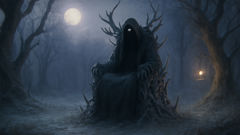
Each step takes her deeper into the realm where human rules fail and superstition becomes law. Birds fall silent as she passes. The wind dies. She senses she’s being watched—not just by animals, but by the forest itself. Sometimes she hears footsteps that don’t match her own; sometimes, laughter flutters through the bracken like the flap of a raven’s wing. The red string around her wrist feels warm, almost pulsing, as if it’s drawing energy from the air.
The first sign she’s crossed a threshold comes when she finds herself walking in circles. No matter how she turns, she comes back to a clearing dominated by a broken stone well. It’s choked with weeds and rimed with frost despite the season. She remembers Ivan’s warning: “Likho finds those who draw her notice.” With trembling hands, she drops a crumb of bread into the well and whispers a plea for safe passage.
Night falls quickly here, squeezing the world into a cold pocket of darkness. Katya lights a tiny lamp, its flame trembling like her resolve. Shadows creep along the ground. Out of the corner of her eye, she sees glimpses: a single white eye shining in the dark, a thin hand beckoning from behind a birch, a voice whispering her name. She refuses to answer, remembering the wise woman’s warning: never bargain with Likho on Likho’s terms.
At midnight, she stumbles into a clearing where the moon shines through tangled branches. In the center stands a throne made from bones and antlers, draped with tattered black cloth. Likho waits there—a towering figure with skin like old bark, hair of tangled moss, and a single, luminous eye that sees through darkness and deceit.
“Katya,” Likho hisses, voice like wind through hollow logs. “Why do you seek me?”
Katya steadies herself. “You have cursed my village. My family suffers. I want to break your hold.”
The Likho smiles—a slit of darkness across its face. “Fate is not so easily changed. Misfortune is as much a part of life as hope.”
They bargain through riddles and stories. Likho asks Katya what she values most—her home, her family, her own soul. Each answer is met with laughter that chills her bones. She remembers the wise woman’s advice: offer nothing you can’t bear to lose. Katya offers instead her fear. “Take my fear of you,” she says. “Leave my village in peace.”
The Likho considers. “Fear is sweet. But fear is what makes me strong.”
As dawn approaches, Likho offers a bargain: a test of fate. “Spend three days in my realm without misfortune befalling you, and I will lift my curse. But if bad luck finds you even once, your life is mine.”
With no other choice, Katya accepts. For three days she wanders the Likho’s forest, each step a trial. She slips on roots but does not fall; she drinks from streams that taste of iron but do not poison her; she avoids snares set by unseen hands. The forest taunts her with dangers—hidden pits, falling branches, sudden storms—but Katya moves carefully, trusting instinct and refusing despair.
On the final day, as she nears the throne again, she finds a wounded bird tangled in brambles. Helping it risks her own safety: the brambles are sharp, and Likho watches. Still, Katya frees the bird, cradling it until it flies away. In that moment, Likho appears at her side.
“You risked misfortune for another,” Likho whispers. “Why?”
“Because fate is not only suffering,” Katya replies. “It’s also kindness, even when luck is thin.”
The Likho’s single eye closes for a moment, and when it opens, Katya feels the weight of its gaze lessen. “You’ve passed my test, but remember: I am never truly gone. Where there is fear, I remain.”
The throne crumbles to dust. The forest brightens. Katya finds herself at the edge of the woods, the red string around her wrist burned to ash. The shadows are thinner, and in the hush that follows, hope takes root.
Conclusion
Katya returns to her village changed. The curse is lifted: cows give milk again, the fields dry out, and laughter returns to the hearths. Grandmother weeps with joy, holding Katya close as if to anchor her to this world. The villagers—once wary—now look at her with awe and gratitude, though a trace of fear remains. After all, those who walk with spirits are never quite the same.
Katya keeps the memory of Likho close, a scar and a shield. She knows misfortune is never banished for good; it waits on the margins, ready to slip through cracks in courage. But she also understands now that fate is not a chain, but a thread—fragile, easily tangled, yet capable of being rewoven with acts of kindness and stubborn hope. She teaches the children new stories: not just warnings about Likho, but tales of compassion in the face of darkness, of standing tall even when luck deserts you.
In time, Katya becomes the new wise woman of the village—her hut filled with red strings, charms, and laughter. On cold nights when shadows crowd the windows, she sits by the fire and tells how she faced the Likho and found within herself the power to shape her own destiny. And somewhere deep in the forest, where moonlight gilds ancient bones, Likho listens—and smiles its secret smile, knowing that every story of misfortune is also a story of courage.

